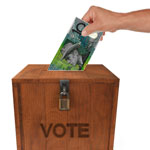Bet on Sports at Work – 4 Americans Lose Jobs for Fantasy Football

Four employees of a Texas company called Fidelity were fired for playing fantasy football at work. Fantasy football involves creating virtual teams out of pro football players, then using the real player’s statistics to determine the results. Pooled money from all participants provides prizes. A Fidelity spokesperson claims the company has strict rules against gambling.
Reuters: Fantasy sports at work spark concerns after report
Fantasy sports leagues are up in arms after news got out that a company called Fidelity Investments recently fired four employees for playing fantasy football while at work.
President of The Fantasy Sports Trade Association Paul Charchian said on Wednesday that the association is concerned that the incident marks the start of a battle between employers and the popular pastime of internet sports betting. Charchian cited a June survey that found 29 million people played fantasy sports in the United States and Canada in the past year, up from 20 million people in 2007.
Fantasy sports games revolve around the statistics or actual professional athletes. Players put together a virtual team and convert the stats of each player into online points, winning money when their “team” performs well. The money comes from participants who pool funds to fuel the games. Many offices tolerate fantasy games, and some even encourage them as morale-builders. Others question shether these games amount to gambling in the true sense.
Cameron Pettigrew, a manager at Fidelity’s Westlake office in Texas, along three other employees were fired by Fidelity for participating in the fantasy sports. A Fidelity spokeswoman said “We have policies in place that address a variety of professional conduct standards for our employees”.
Few details have been released concerning how Pettigrew’s league worked or why Fidelity may have objected to it.
Boston Herald: Fidelity fires 4 in fantasy football
Fidelity Investments in Texas reportedly fired four employees for participating fantasy football while at work.
Cameron Pettigrew, a manager at Fidelity, told the Fort Worth Star-Telegram how he and three other employees lost their jobs at the Boston-based mutual fund corporation.
Pettigrew, who worked for Fidelity for 2 years before losing his job, could not be reached for comment.
Vin Loporchio, a spokesperson for Fidelity, said that the company does not comment on current or former employees “out of respect for their privacy and confidentiality,” and would not provide information.
“Our company policies address a variety of professional conduct standards for our employees,” Loporchio said yesterday in an e-mail to the Boston Herald. “Beyond that, however, we would not have anything to add.”
Loporchio told the Star-Telegram that Fidelity has “clear policies” relating gambling. “Participation in any form of gambling through the use of Fidelity time or equipment or any other company resource is prohibited,” the newspaper quoted Loporchio as saying. “We want our employees to be focused on our customers and clients.”
NBC Dallas/Fort Worth: Fired for Tackling Fantasy Football
A broker at a financial company in Westlake, Florida, claims that he lost his job for playing fantasy football while at work.
“I’m being 100 percent honest,” said Cameron Pettigrew. “It’s as ludicrous as it sounds.”
Pettigrew said his former employer, Fidelity Investments, let go of him and three others in October for organizing $20 fantasy football games. Fantasy football is a popular sports game in which participants bet on the performances of real football players.
“I loved my job at Fidelity,” Pettigrew said. “My whole argument is, the punishment didn’t fit the crime.”
Vin Loporchio, a spokesman for Fidelity told the Fort Worth Star-Telegram that the company has a clear policy against gambling. “Participation in any form of gambling through the use of Fidelity time or equipment or any other company resource is prohibited,” said Loporchio. “We want our employees to be focused on our customers and clients.”
Pettigrew claimed to understand the company’s policy but didn’t think it was enforced. “We had people in management and leadership doing it, ever since the first day I was there,” he said. “I thought it was a rule nobody took seriously.”
Pettigrew is now unemployed and looking for work.


Four employees of a Texas company called Fidelity were fired for playing fantasy football at work. Fantasy football involves creating virtual teams out of pro football players, then using the real player’s statistics to determine the results. Pooled money from all participants provides prizes. A Fidelity spokesperson claims the company has strict rules against gambling.
Reuters: Fantasy sports at work spark concerns after report
Fantasy sports leagues are up in arms after news got out that a company called Fidelity Investments recently fired four employees for playing fantasy football while at work.
President of The Fantasy Sports Trade Association Paul Charchian said on Wednesday that the association is concerned that the incident marks the start of a battle between employers and the popular pastime of internet sports betting. Charchian cited a June survey that found 29 million people played fantasy sports in the United States and Canada in the past year, up from 20 million people in 2007.
Fantasy sports games revolve around the statistics or actual professional athletes. Players put together a virtual team and convert the stats of each player into online points, winning money when their “team” performs well. The money comes from participants who pool funds to fuel the games. Many offices tolerate fantasy games, and some even encourage them as morale-builders. Others question shether these games amount to gambling in the true sense.
Cameron Pettigrew, a manager at Fidelity’s Westlake office in Texas, along three other employees were fired by Fidelity for participating in the fantasy sports. A Fidelity spokeswoman said “We have policies in place that address a variety of professional conduct standards for our employees”.
Few details have been released concerning how Pettigrew’s league worked or why Fidelity may have objected to it.
Boston Herald: Fidelity fires 4 in fantasy football
Fidelity Investments in Texas reportedly fired four employees for participating fantasy football while at work.
Cameron Pettigrew, a manager at Fidelity, told the Fort Worth Star-Telegram how he and three other employees lost their jobs at the Boston-based mutual fund corporation.
Pettigrew, who worked for Fidelity for 2 years before losing his job, could not be reached for comment.
Vin Loporchio, a spokesperson for Fidelity, said that the company does not comment on current or former employees “out of respect for their privacy and confidentiality,” and would not provide information.
“Our company policies address a variety of professional conduct standards for our employees,” Loporchio said yesterday in an e-mail to the Boston Herald. “Beyond that, however, we would not have anything to add.”
Loporchio told the Star-Telegram that Fidelity has “clear policies” relating gambling. “Participation in any form of gambling through the use of Fidelity time or equipment or any other company resource is prohibited,” the newspaper quoted Loporchio as saying. “We want our employees to be focused on our customers and clients.”
NBC Dallas/Fort Worth: Fired for Tackling Fantasy Football
A broker at a financial company in Westlake, Florida, claims that he lost his job for playing fantasy football while at work.
“I’m being 100 percent honest,” said Cameron Pettigrew. “It’s as ludicrous as it sounds.”
Pettigrew said his former employer, Fidelity Investments, let go of him and three others in October for organizing $20 fantasy football games. Fantasy football is a popular sports game in which participants bet on the performances of real football players.
“I loved my job at Fidelity,” Pettigrew said. “My whole argument is, the punishment didn’t fit the crime.”
Vin Loporchio, a spokesman for Fidelity told the Fort Worth Star-Telegram that the company has a clear policy against gambling. “Participation in any form of gambling through the use of Fidelity time or equipment or any other company resource is prohibited,” said Loporchio. “We want our employees to be focused on our customers and clients.”
Pettigrew claimed to understand the company’s policy but didn’t think it was enforced. “We had people in management and leadership doing it, ever since the first day I was there,” he said. “I thought it was a rule nobody took seriously.”
Pettigrew is now unemployed and looking for work.

Australian elections are over. Who did you bet on?

Australia’s national election ended yesterday with Labor Party leader Julia Gillard emerging as the country’s new Prime Minister. While millions of Australians used votes to back their pick for the new PM, many others chose to use money instead, placing bets on their favorite candidate at some of the top online sportsbooks in Australia.
Betting on political candidates in Australia has been something of a controversy lately. Back in July, MP Michael Johnson tried very hard to ban online betting on elections, arguing that important political decisions are inappropriate things to be wagering on. Johnson was also concerned that betting on political elections could influence the outcome if unscrupulous political parties used betting as leverage to twist elections in their favor.
Despite Johnson’s efforts, no ban has been placed on election betting. Internet sports betting websites across Australia as well as in other parts of the world offered lines on all candidates.
Interestingly, one of Julia Gillard’s primary campaign efforts focused on the issue of gambling. She has expressed a strong desire to reform Australian gambling laws, implementing stricter regulations on pokies as well as offering tighter regulation of online gambling in the country. Most gambling licenses are not up for renewal until 2012, however, so few changes are likely to be made until then.


Australia’s national election ended yesterday with Labor Party leader Julia Gillard emerging as the country’s new Prime Minister. While millions of Australians used votes to back their pick for the new PM, many others chose to use money instead, placing bets on their favorite candidate at some of the top online sportsbooks in Australia.
Betting on political candidates in Australia has been something of a controversy lately. Back in July, MP Michael Johnson tried very hard to ban online betting on elections, arguing that important political decisions are inappropriate things to be wagering on. Johnson was also concerned that betting on political elections could influence the outcome if unscrupulous political parties used betting as leverage to twist elections in their favor.
Despite Johnson’s efforts, no ban has been placed on election betting. Internet sports betting websites across Australia as well as in other parts of the world offered lines on all candidates.
Interestingly, one of Julia Gillard’s primary campaign efforts focused on the issue of gambling. She has expressed a strong desire to reform Australian gambling laws, implementing stricter regulations on pokies as well as offering tighter regulation of online gambling in the country. Most gambling licenses are not up for renewal until 2012, however, so few changes are likely to be made until then.



